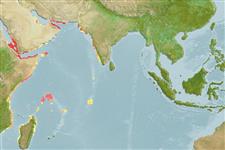Teleostei (teleosts) >
Ovalentaria/misc (Various families in series Ovalentaria) >
Pseudochromidae (Dottybacks) > Pseudochrominae
Etymology: Pseudochromis: Greek, pseudes = false + Greek, chromis = a fish, perhaps a perch (Ref. 45335).
Environment: milieu / climate zone / depth range / distribution range
Ecology
Marine; reef-associated; depth range 2 - 10 m (Ref. 9710), usually 2 - 10 m (Ref. 27115). Tropical; 24°C - 27°C (Ref. 27115)
Western Indian Ocean: southern Red Sea, Golfe de Tadjoura (Djibouti) and Yemeni coast of the northern Gulf of Aden; also in Socotra Archipelago.
Size / Weight / Age
Maturity: Lm ? range ? - ? cm
Max length : 7.0 cm TL male/unsexed; (Ref. 9710)
Inhabits rock and coralline ledges and caves (Ref. 9710). In Socotra Archipelago, it is mainly recorded from the north coasts from hard coral communities including those dominated by Millepora and Porites, and encrusting and massive Agariciidae, Pectiniidae, and Mussidae, as well as from mixed communities of macroalgae and hard corals on rock platform and mixed encrusting communities on exposed rock platform, and a near vertical rocky drop off (Ref. 88695). Occurs in colonies. Has been reared in captivity (Ref. 35413).
Life cycle and mating behavior
Maturities | Reproduction | Spawnings | Egg(s) | Fecundities | Larvae
Lieske, E. and R. Myers, 1994. Collins Pocket Guide. Coral reef fishes. Indo-Pacific & Caribbean including the Red Sea. Haper Collins Publishers, 400 p. (Ref. 9710)
IUCN Red List Status (Ref. 130435)
Threat to humans
Harmless
Human uses
Fisheries: commercial; aquarium: commercial
Tools
Special reports
Download XML
Internet sources
Estimates based on models
Preferred temperature (Ref.
123201): 27.5 - 29.3, mean 28.5 °C (based on 169 cells).
Phylogenetic diversity index (Ref.
82804): PD
50 = 0.5000 [Uniqueness, from 0.5 = low to 2.0 = high].
Bayesian length-weight: a=0.00490 (0.00187 - 0.01281), b=3.11 (2.88 - 3.34), in cm total length, based on LWR estimates for this (Sub)family-body shape (Ref.
93245).
Trophic level (Ref.
69278): 3.4 ±0.5 se; based on size and trophs of closest relatives
Fishing Vulnerability (Ref.
59153): Low vulnerability (10 of 100).
